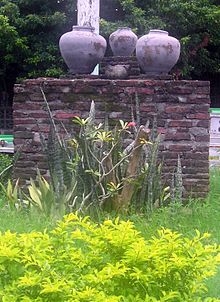For other uses, see Basi (disambiguation) .
Basi A float in the depicting a giant basi tapayan
Type Alcoholic drink Country of origin Philippines Region of origin Ilocos region Alcohol by volume 10%-16%[1] Ingredients Sugarcane
Monument to the
Basi Revolt Basi is a fermented alcoholic beverage made from sugarcane in the Ilocos region of northern Luzon in the Philippines .
Description [ ] Basi is the local beverage of Ilocos in northern Luzon in San Ildefonso where it has been consumed since before the Spanish conquest . In the Philippines, commercial basi is produced by first crushing sugarcane and extracting the juice. The juice is boiled in vats and then stored in earthen jars (tapayan glutinous rice and duhat (java plum) bark or other fruits or barks is added. The jars are then sealed with banana leaves and allowed to ferment for several years. The resulting drink is pale red in color. If fermented longer, it turns into suka or vinegar.
Basi Revolt [ ] Main article: Basi Revolt
The 1807 Basi Revolt in Piddig , Ilocos Norte , occurred when the Philippines' Spanish rulers effectively banned private manufacture of the beverage. A Basi festival is held annually in Naguilian, La Union .
Recently, the Sangguniang Bayan of San Ildefonso approved a resolution declaring September 16 as a non-working holiday and named the old road in Gongogong as Ambaristo street in honor , leader of the Basi Revolt . Mayor Christian Purisima enrolled basi as their entry into the “One Town; One Product ” (OTOP) program of Savellano.[2]
Commercial production [ ] Basi del Diablo Wines of the Salucop Group, Inc. started making basi in the year 1906, 99 years after the Basi Revolt. The light fermented sugarcane winemaker's most prominent product is the Ambaristo, named after the Basi Revolt hero Pedro Ambaristo.[3]
Nagguilian Basi is another basi brand in the northern part of the Philippines. It is produced in Naguilian, La Union.[4]
See also [ ] Palek Intus Palm wine Tapuy Tapai Tapayan References [ ]
Alcoholic drinks
History and production
History of alcohol
History of alcoholic beverages History of beer History of wine
History of Bordeaux wine History of Champagne History of Chianti History of Rioja wine History of Sherry Production
Alcohol industry Bathtub gin Brewing
Malting Lautering Wort Yeast Distillation Drinking establishments Fermentation Winemaking
Fermented drinks by ingredients
Fruit
Apple
Cider Banana
Banana beer Banana wine Bignay
Bignay wine Bokbunja
Bokbunja-ju Grape
Madeira wine Marsala wine Mistelle Moscatel de Setúbal Port wine Red wine Rosé wine Sherry Vermouth White wine Java plum
Duhat wine Lychee
Lychee wine Pear
Perry Pineapple
Tepache Plum
Plum jerkum Pomegranate
Rimon Prickly pear
Colonche Various fruits
Conditum Dubonnet Hippocras Jabol Mulled wine Nabidh Pruno Sangria Cereals
Barley
Barley wine Corn
Mageu Pozol Tejuino Tesgüino Millet
Oshikundu Tongba Rice
Agkud Amazake Apo Beopju Brem Choujiu Chuak Dansul Gwaha-ju Hariya Makgeolli Mijiu Mirin Pangasi Rice wine Rượu cần Sake Sato Shaoxing wine Sonti Tapai Tapuy Rye
Kvass Sorghum
Pendhā Multiple grains
Ale Ara Beer Boza Huangjiu Other
Agave
Pulque Coconut and other palms
Bahalina Palm wine Tuak Tubâ Tuhak Tunggang Dairy
Kumis Ginger
Ginger wine Galangal
Byais Honey
Bais Byais Kabarawan Mead Sugar
Fermented water
Kilju Sugarcane or molasses
Basi Intus Palek Tea
Fermented tea Kombucha Various starches
Cauim Chicha Parakari Ibwatu
Liquors by ingredients
Fruit
Apple
Applejack Calvados Cashew apple
Feni Cherry
Kirschwasser Dates
Araqi Fig
Boukha Grape
Arak Armagnac Brandy Cognac Pisco Zivania Juniper
Gin Plum
Slivovitz Țuică Pomace Chacha Grappa Marc Orujo Tsikoudia Tsipouro Zivania Various fruits
Brandy Eau de vie Geist Himbeergeist Marillenschnaps Nalewka Oghi Pálinka Rakia Schnaps Cereals
Barley
Irish whiskey Japanese whisky Scotch whisky Beer
Bierbrand Buckwheat
Buckwheat whisky Maize
Bourbon whiskey Corn whiskey Tennessee whiskey Rice
Awamori Cheongju Cholai Lao-Lao Lihing Rice baijiu Shochu Soju Sulai Rye
Korn Rye whiskey Starka Sorghum
Baijiu (Kaoliang wine )Multiple grains
Ara American whiskey Canadian whisky Shōchū Whisky Other
Agave Mezcal Tequila Coconut and other palms
Arrack Lambanog Dairy
Arkhi Sugarcane or molasses
Aguardiente Cachaça Clairin Desi daru Guaro Rum Seco Herrerano Sulai Sura Tharra Various starches
Aguardiente Akvavit Bangla Horilka Poitín Shōchū Vodka
Liqueurs and infused distilled drinks by ingredients
Almond
Amaretto Crème de Noyaux Anise
Absinthe Anisado
Anisado Mallorca Anisette Arak Hierbas
Herbs de Majorca Mastika Ouzo Rakı Sambuca Beer
Bierlikör Blackthorn shrub
Patxaran Cherry
Cherry Heering Maraschino Chili peppers
Pertsivka Chocolate
Chocolate liqueur Cinnamon
Tentura Cloudberry Lakka Coconut
Malibu Coffee
Kahlúa Tia Maria Cream
Cream liqueur
Irish cream Egg
Advocaat Eggnog Hazelnut
Frangelico Herbs
Aquavit Bénédictine Brennivín Crème de menthe Metaxa Unicum Honey
Bärenjäger Drambuie Glayva Irish Mist Krupnik Juniper
Gin Jenever Orange
Cointreau Curaçao Grand Marnier Triple sec Star anise
Pastis Sassolino Sugarcane/molasses
Charanda Vanilla
Licor 43 Various fruits
Campari Cedratine Crème de banane Crème de cassis Limoncello Schnapps Sloe gin Walnut
Nocino
Filipino cuisine
Main dishes Noodles and pasta Sausages Lumpia and turón Breads Kakanin (ricecakes)desserts Condiments
Agre dulce (sweet and sour sauce)Achuete Asín tibuok Atchara Bagoong Bagoong alamang Bagoong monamon Bagoong terong Banana ketchup Biasong Bukayo Burô (tapay)Calamansi Cane vinegar Coconut vinegar Dayap Dayok Dungon Galapóng Gamet Gatâ (coconut milk)Giniling Gulaman Gusô Kakang gatâ (coconut cream)Kamias Kaong Kaong palm vinegar Kasubha Keso de bola Kesong puti Labóng Landang Latik Latô Lemongrass Liver spread (Lechon sauce)Luyang dilaw Macapuno Minatamís na báo Muscovado Nata de coco Nata de piña Nipa palm vinegar Pakô Palapa Pandan Panutsa Patis Pili nut Saba banana Sago Siling haba Siling labuyo Spiced vinegar Taba ng talangka Tabon-tabon Toyomansi Toyo, suka, at sili Túltul Ube Ubad Ubod Beverages
Agkud Anisado Bahalina Bais Basi Barako coffee Benguet coffee Bignay wine Buko pandan drink Byais Calamansi juice Dubado Duhat wine Intus Kabarawan Kinutil Lambanog Mallorca Palek Pangasi Sagada coffee Salabat Sago at gulaman Samalamig Sulu coffee Tapuy (Baya)Tsokolate Tubâ Tubho tea Tuhak Tunggang


